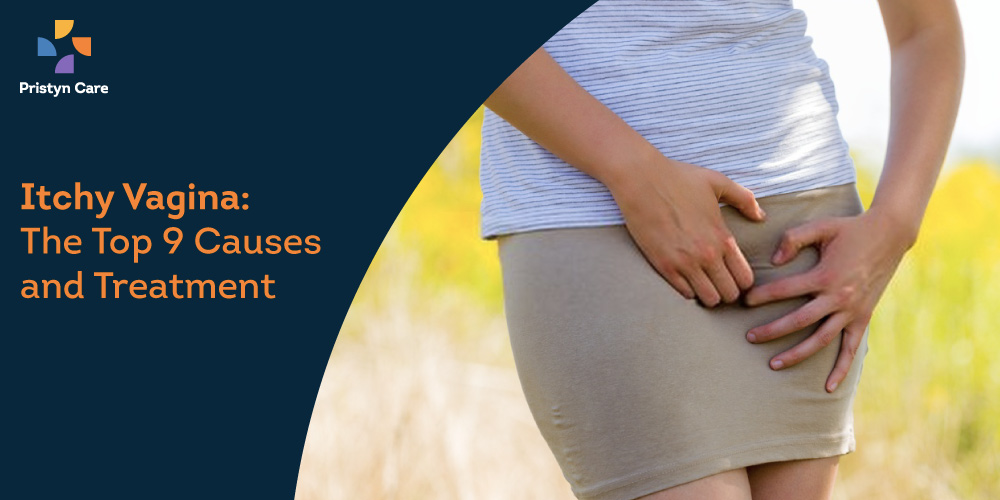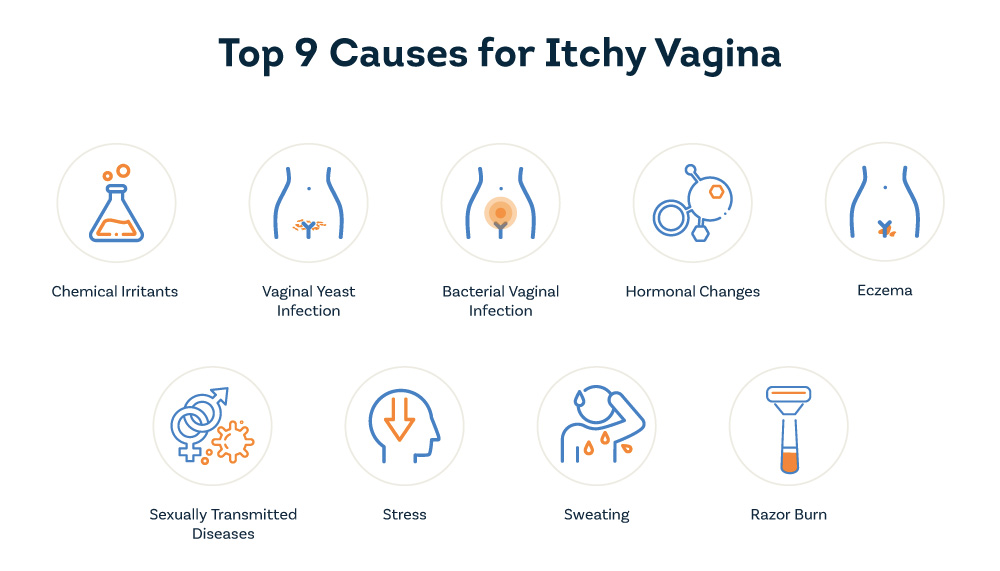
Data records 1 out of every 10 women experiences regular and incessant vaginal itching at some point of time. India alone had 9,17,960 google searches on ‘itchy vagina’ in the year 2021.
Hence, the condition is serious, common, and yet very less talked about. This article details nine of the most common causes of vaginal itching, their treatments, and recovery.

Table of Contents
Chemical Irritants
Cause
The vagina is a comparatively much more sensitive and delicate area. Exposing it to chemicals such as soaps, scents, creams, ointments, and topical contraceptives can potentially disturb its natural pH balance. This then brings an advertent burning sensation and incessant itching, sometimes also triggering urinary tract infection (UTI).
Treatment
In case you have been using any of the artificial vaginal washes, feminine sprays, or scented products, and hence face an incessant itch, discontinue the product at the earliest and switch to plain water. Post cleansing, gently pat dry, and wear cotton underwear. Also, refrain from any sexual intercourse for a minimum of 3-5 days.
Recovery
The itch should normalize naturally in 2- 3 days and the vagina should switch to its normal pH. In case the irritation persists, consult a gynecologist immediately. It may be because of a varying underlying cause and require immediate medical attention.
Vaginal Yeast Infection
Cause
Vaginal Yeast Infection is one of the most common vaginal infections and affects 3 out of every 4 women once in their lifetime. This is especially common as a woman first turns to regular sexual life or intakes a regular dose of antibiotics.
Some common symptoms include intense itching, redness, foul smell, and a white rubbery discharge. Medically, we see this as an imbalance of good and bad bacteria.
Typically, a small amount of yeast naturally occurs in the vaginal walls. However, at times, if the good and bad bacteria imbalances in the body, the naturally present yeasts may grow inadvertently. This overgrowth then triggers vaginal yeast infection.
Treatment
Yeast Infection is typically treated with imidazole medicines such as clotrimazole and miconazole. They can be taken both- orally or topically. At times, it is also paired with antifungal medications such as fluconazole or ibrexafungerp for a prescription period of 1-7 days. As you take your medicines, refrain from any sexual intercourse for a minimum of 3 days or as suggested by your doctor.
Recovery
The yeast infection typically takes 3-7 days to recover. And as you heal, we suggest, you use only plain water to cleanse through and gently pat dry. This would quicken the recovery and negate any parallel infections.
While the itching should simmer within 3-4 days of medicine, in case it persists, consult a gynecologist immediately. It may be because of a varying underlying cause and require immediate medical assistance.
Also Read:
Ways to Heal Vagianl Yeast Infection
Bacterial Vaginal Infection or Bacterial vaginosis (BV)
Cause
Bacterial Vaginal Infection, in the simplest sense, is an imbalance between the naturally occurring good and bad bacteria in the vagina. The overgrowth of anaerobes (bad bacteria) triggers an intense vaginal itching, thin watery discharge, and a foul, fish-like smell. It also increases the vaginal pH to more than 4.5 and causes redness, swelling, and a burning sensation as one passes urine.
Treatment
The infection can be easily treated with antibiotics like metronidazole, clindamycin, tinidazole, or secnidazole. These can be taken both- orally and topically and show results within 5-7 days. However, do not take these medicines by yourself. A bacterial vaginal infection is very much similar to a yeast infection in symptoms. Therefore, your doctor is the best person to help you diagnose the exact cause of your vaginal discomfort and guide you through the right medication.
Recovery
The bacterial infection typically takes 5-7 days to recover. And as you heal, we suggest, you use only plain water to cleanse through your vagina and gently pat dry. This would keep you away from any parallel infections and fasten the recovery. As additional care, you could also include some homegrown curd and yogurt to balance anaerobes with curd’s natural lactobacilli.
As you recover, avoid drinking alcohol and having sexual intercourse for a minimum of 3 days. Both could trigger infections and cause nausea.
While the itching should simmer within 3-4 days of medicine, in case it persists, consult a gynecologist immediately. It may be because of a varying underlying cause and require immediate medical assistance.
If bacterial vaginal infection happens while you are pregnant, consult your OBGYN at the earliest. It could risk premature delivery and low birth weight.
Call Now to Book a Free Appointment with our female OB-Gynecologist in your City.
Hormonal Changes
Cause
As a woman ages, so does her vagina. And it is only natural for her hormones to fluctuate and vaginal tissues to become thin and dry due to lack of estrogen. Typically, in a healthy vagina, the vaginal walls stay lubricated through a thin, clear layer of liquid. The female hormone estrogen helps maintain the fluid and keeps the wall thick and elastic. However, with age and hormone fluctuations, the vaginal cells become old and dead. This triggers unwanted itching, bad hygiene and at times- urinary leakage.
This is extremely common among women in their 20s and 30s or post child birth.
Treatment
Vaginal Itching caused due to hormonal fluctuations or aging is best treated through Laser Vaginal Rejuvenation (LVR). The procedure is quick, simple, minimal blood loss and requires no anesthesia or downtime. The process uses a small laser probe to gently deliver laser energy to your vaginal tissue. This in turn increases natural blood flow and stimulates collagen. Thereby, adding new cell growth, vaginal toning, lubrication, and good health.
Recovery
LVR as treatment requires no downtime or bed rest. However, depending on your individual vaginal health, your doctor may prescribe you 2-3 or 3-5 sessions. Each is performed at a minimum break of 15-20 days. Hence, ranging from anywhere between 2-3 months.
As you undertake this procedure, we suggest you refrain from sexual intercourse on day 0 and day 1. This would restrict the chances of any infection or vaginal discomfort.
To Know More about Laser Vaginal Rejuvenation, or Book a Free Appointment with our OB-Gynecologist in your City, Call Now.
Eczema
Cause
Eczema, also known as atopic dermatitis, is a skin condition typically triggered through a weak immune system, genetics, stress, or environmental factors. Once triggered, it can cause intense itching, redness, and rashes.
At times, when the immune system imbalances, stress increases, or vaginal skin comes in contact with an allergen such as fragrance, beauty products, poison ivy, nickel, etc, eczema may activate in the vaginal area and damage its skin cells and trigger an immune system reaction. This in turn leads to a dry scaling in the vaginal area, constant vaginal itching, blistering, and burning sensation on the vulva, labia lips, urethra, and the cheeks of your buttocks. Any delay in treatment could thereby cause bleeding and a series of Urinary Tract Infections
Treatment
Vaginal eczema is usually treated with topical corticosteroid cream applied twice a day for 2-3 weeks. In case of severity, it may also be paired with an antihistamine or steroid-sparing medications such as pimecrolimus and tacrolimus.
Recovery
Recovery post vaginal eczema generally takes a minimum of 2-4 weeks. As you heal, we suggest you use cold packs and pain killers to relieve itching, redness, and pain. Also, as you cleanse your vaginal area, do not douche. Stay away from any fragrant product or wipes and use only water and fingers for genital hygiene.
Sexual intercourse must be refrained for at least 4 weeks of your treatment. Intercourse may lead to itching, burning, and infection in both partners.
Sexually Transmitted Diseases
Cause
Multiple STDs including chlamydia, genital warts, gonorrhea, genital herpes, and trichomoniasis can be triggered through unprotected sexual intercourse with someone who has them already. The symptoms include- abnormal growths, incessant itching, yellow or green vaginal discharge, and pain while urinating.
Treatment
The treatment for STDs is generally done through antibiotics and antiviral drugs. However, since each infection and disease is different, the exact medication and salt amount may vary. The doctor’s discretion is advised on an immediate basis.
Recovery
The recovery from STI typically takes 7-14 days or at times, 2-3 months. However the same may change based on the individual infection and severity. As you recover, do not engage in any form of sexual activity (oral or penetrative) and use cold packs to ease vaginal discomfort.
Some other, lesser common causes of mild vaginal itching include:
Stress
Cause
Stress and anxiety are directly linked to hormone fluctuations and a drop in natural estrogen levels means a comparatively drier and itchy vaginal area.
Treatment
The simplest solution to vaginal itching because of stress is- take a little break, consciously work on your stress management, wash your genital area with plain water, and rest in comfortable cotton underwear. The itch should calm down within 1-2 days and heal on its own. However, in case the irritation persists, consult a gynecologist/ immunologist/ mind therapist (as needed) for better assistance.
Recovery
As you heal, restrict any sexual activity and actively pick up a light physical exercise such as walking, stretching, or yoga. Focus on keeping your breath light and mind calm.
Sweating
Cause
While sweating is good for maintaining a healthy body temperature, sweat when dried or remained on the skin for a prolonged time can trigger bacterial growth and miliaria. This then causes unwanted sweat rashes and dryness. (Often marked by tiny bumps, itching, and redness around the vagina.)
Treatment
The treatment here remains simple. Wash your vagina with plain water and gently pat dry. Then, switch to comfortable cotton underwear or sleep without bottom clothing for a day or two. This should bring eminent relief.
Recovery
Sweat rashes when treated early can be healed within 4-5 days. However, if delayed, medication may become necessary and take 10-15 days. As you heal, we suggest you restrict any unprotected sexual activity and use only lukewarm water for genital hygiene.
Razor Burn
Cause
Shaving can often result in small cuts, bumps, and razor burns. A razor burn happens when the razor removes the top layer of skin, leaving the free bacteria to invade. This may then result in slight itchiness, red skin, swollen vaginal area, and at times- unwanted pain.
Treatment
Wash the area with plain water, gently pat dry, and let it naturally heal.
Recovery
The itch and other symptoms should relieve within 1-3 days. Meanwhile, you could use cold packs to relieve the pain and swell. Also, avoid smoking. It may cause unnecessary inflammation and dehydration.
Bottom line
An itch, swelling, redness, foul smell, or abnormal vaginal discharge is both- common and treatable. However, in case the condition is left unattended, or not treated at the right time, the symptoms may be severe and result in urinary problems, infections, and vaginal pain.
In case you are experiencing any of the said symptoms, it is best you speak to a gynecologist at the earliest, and seek timely diagnosis and treatment. To speak to one of our best female gynecologists in your city, please call us directly. We can arrange both online and offline consultations.







